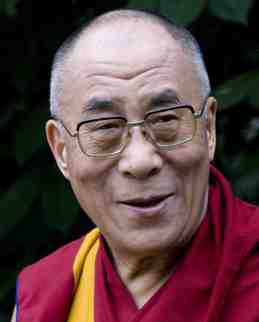Tenzin Gyatso is the fourteenth Dalai Lama of Tibet. He is both head of state (in exile) and the spiritual leader of the Tibetan people. He is admired and esteemed worldwide as a man who has championed policies of nonviolence.

His consistent compassionate nonviolence, even in the face of great aggression, led to his receiving the Nobel Prize for Peacein 1989.
“From my Buddhist viewpoint the mind plays a very dominant role. Actions and events depend heavily on motivation. A real sense of appreciation of humanity, compassion and love, are the key points.
“If we develop a good heart, then whether the field is science, agriculture or politics, since motivation is so very important, the result will be more beneficial. With proper motivation these activities can help humanity; without it they go the other way. This is why compassionate thought is so very important for humankind. Although it is difficult to bring about the inner change that gives rise to it, it is absolutely worthwhile to try.”
In a follow-up, I asked the Dalai Lama if he would be willing to submit a personal story of compassion. Due to his many commitments and travel schedule, his translator and assistant, the Venerable Lhakdor, provided the following:
“If we are to improve this world, then the main source of peace and harmony is the practice of compassion and love in the day-to-day life of individuals.
“His Holiness has developed a genuine conviction in the effectiveness of these positive human qualities in solving human problems, be they individual or social. He is also encouraged by the tremendous amount of resilience shown by many Tibetans in Chinese prisons through the practice of compassion and non-hatred even to their oppressors. Despite harsh treatment and long years of suffering they managed to maintain inner tranquility.
“One prisoner came up with the statement, ‘My time in a Chinese prison proved to be the best time for my spiritual practice.’ Another monk from Namgyal Monastery was in a Chinese prison for seventeen years. When he managed to leave Tibet and come to India, he met with His Holiness. One day, he mentioned to His Holiness that while he was in prison he faced danger on several occasions. His Holiness assumed that his life was in danger. But [the monk] continued, ‘I was in danger of losing compassion towards the Chinese.’”
So how does one go about practicing the kind of compassion that cannot only elevate us but the world towards peace?
“We should begin by removing the greatest hindrances to compassion: anger and hatred,” His Holiness says. “As we all know, these are extremely powerful emotions, and they can overwhelm our entire mind…This is because anger eclipses the best part of our brain: its rationality. So the energy of anger is almost always unreliable. It can cause an immense amount of destructive, unfortunate behavior. Moreover, if anger increases to the extreme, one becomes like a mad person, acting in ways that are as damaging to oneself as they are to others.
“It is possible, however, to develop an equally forceful but far more controlled energy with which to handle difficult situations. This controlled energy comes not only from a compassionate attitude, but also from reason and patience. These are the most powerful antidotes to anger.
“So, when a problem first arises, try to remain humble and maintain a sincere attitude and be concerned that the outcome is fair. Of course, others may try to take advantage of you, and if your remaining detached only encourages unjust aggression, adopt a strong stand. This, however, should be done with compassion, and if it is necessary to express your views and take strong countermeasures, do so without anger or ill intent.”
In the conclusion to his address to the World Conference on Human Rights in 1993, His Holiness reminds all of us of our own responsibilities.
“The most secure foundation for a new world order is not simply broader political and economic alliances, but each individual’s genuine practice of love and compassion. These qualities are the ultimate source of human happiness, and our need for them lies at the very core of our being. The practice of compassion is not idealistic, but the most effective way to pursue the best interests of others as well as our own. The more we become interdependent the more it is in our own interest to ensure the well-being of others.
“I strongly believe that individuals can make a difference in society. Every individual has a responsibility to help move our global family in the right direction and we must each assume that responsibility.”
Comments









